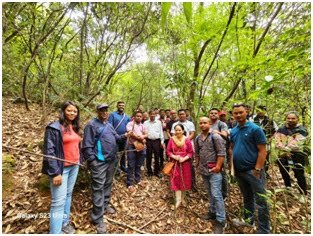The National Institute of Rural Development and Panchayati Raj, North Eastern Regional Centre, Guwahati and the State Institute of Rural Development (SIRD), Meghalaya, jointly organized a five-day regional off-campus training programme on the topic ‘Strategies for Planning and Implementation of Carbon Neutral Villages’.
The May 8-12 programme was held to address India’s performance on climate action. Officials representing the Department of Agriculture, Horticulture, Forestry, Fisheries, Rural Development, State Biodiversity Boards, Meghalaya Basin Development Agency and other organizations drawn from Assam, Meghalaya and Mizoram participated in the programme to deliberate on biodiversity legislation and the institutional mechanism for implementation, roles and responsibilities of Biodiversity Management Committees (BMCs) for good governance at the local village level.
This training module has been developed to create a pool of employees who can create awareness among the village communities and support the BMC emphasizing on ‘Access and Benefit Sharing Provisions’, preparing PBR (People’s Biodiversity Register), estimation of carbon emission, sequestration process and sink, marketing of carbon credits and enhancement of biodiversity through holistic approaches of the rural development flagship programmes including centrally sponsored line department schemes could enhance the afforestation, biodiversity and livelihood opportunities of tribal rural households.
India’s performance on climate action has been rated as ‘high’ in the greenhouse gas emissions, energy use and climate policy categories, ‘medium’ in renewable energy and is already on track to meet its 2030 emissions target aligned to a well-below the ‘2 degree Celsius scenario’.
India made further progress towards a 1.5 degree C future at COP26, declaring an intent to achieve net-zero emissions by 2070 to achieve a five-fold strategy to reduce shortages of water, food and greater risks to health.
An interactive session on PBR and a case study of Khweng BMC in detail regarding seven PBR formats was held as well as a lecture on ‘Access and Benefit Sharing Provisions’, facilitating the village household and village council with economic benefits and respective shares.
Participants were also exposed to the National Bamboo Mission for biodiversity conservation with focus on promotion of bamboo in degraded lands, scrub forests to sequester as much carbon as possible and accelerate the rural livelihood and economy through value addition.
Session on agroforestry models, criteria for selection of agroforestry tree species, types of agroforestry models, merits and demerits were discussed at length.
The programme focused on interactive deliberations including two days of practical exposure. Participants visited the community village forests in Sohra, Umdiengpoh, home based nursery at Laitthemlangsah as well as assisted natural regeneration in Dympep village managed by the community. Participants also visited the Mawphlang Sacred Grove, which is a carbon sink protected with the concept of local indigenous tribal divinity.
For wider dissemination of knowledge on carbon neutral villages, a similar programme will be conducted in collaboration with SIRD Meghalaya on August 7 to 11 at the SIRD Meghalaya Nongsder campus.
























